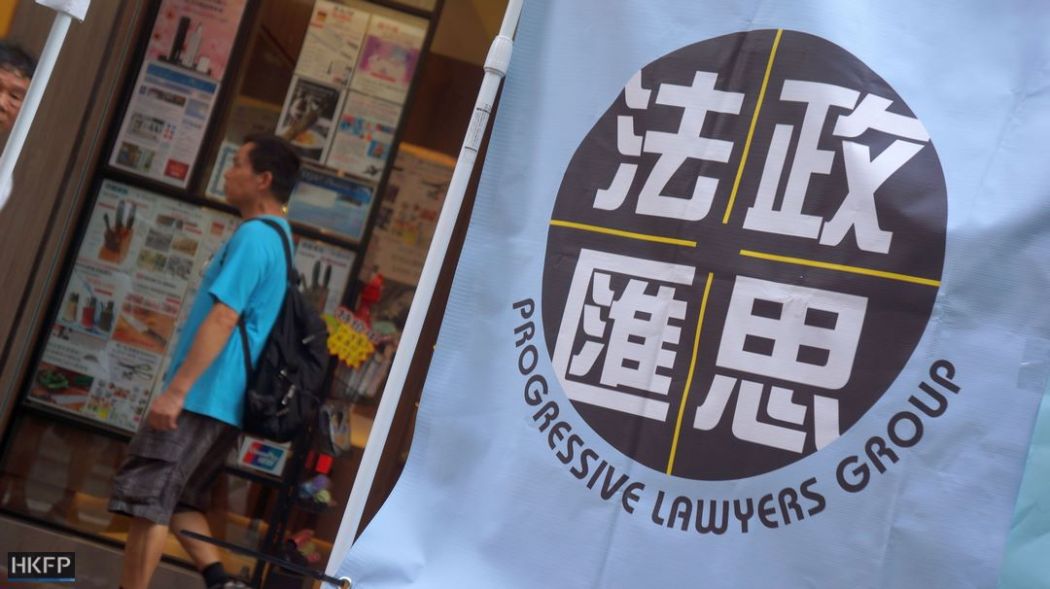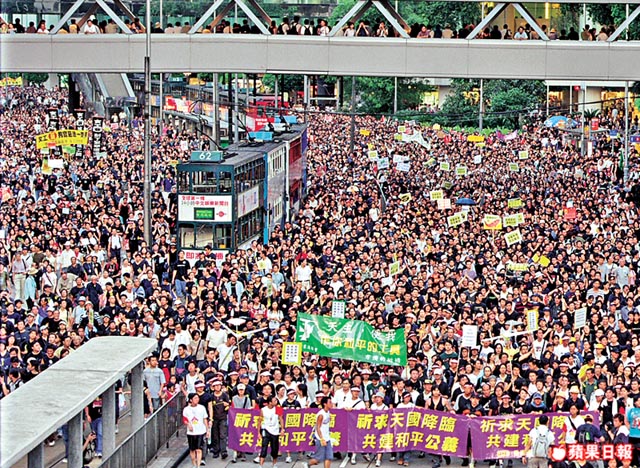Written in 2019, a report on Hong Kong’s rule of law may make for uncomfortable reading – but to the authors, it is also a reminder that there is much work to be done.
Next month the Progressive Lawyers Group (PLG) will launch what it hopes will be an annual tradition: a record of major events affecting Hong Kong’s rule of law, paired with its own legal analysis and recommendations.
The effort is spearheaded by its three convenors: Chris Ng, who took on the role last year, with newcomers Billy Li and Jason Ng.

Formed in January 2015, the group started with around 50 members from the legal industry and academia. Its membership has doubled in the four years since, and PLG has become a regular fixture at protest marches and petitions.
In an interview with HKFP, new convenors Li and Ng said that their new initiative will hopefully serve as a useful reference tool both at home and overseas.
“People often say ‘it’s a dark day for the rule of law,’ but… what is the actual impact of events?” Li said. “We want to explain how different things are tied to the rule of law, and help the public better understand the concept.”
See also: Rights lawyer Chris Ng recalls Mong Kok’s night of unrest and ponders the city’s legal future
The upcoming report will be bilingual and run to over 300 pages. It also contains over 60 recommendations: “We don’t want to give the impression that we only criticise,” Ng said.
Hong Kong’s rule of law has been the subject of international study, but PLG’s report will benefit from the perspective of local practitioners, Ng added.
“For example, the US report on Hong Kong’s rule of law is partly based on translated news articles. There is not a lot of analysis, and they are not very familiar with local dynamics.”

As one of Hong Kong’s top judges, Kemal Bokhary, predicted in 2012, a “storm of unprecedented ferocity” was gathering over the city’s rule of law.
Now that the storm has clearly arrived, there is a sense that PLG is taking stock. It was important to create a big picture of the city’s progress – or regress – on a yearly scale, Li said, to keep things in perspective.
Article 23 reanimated
In the 2001 comedy film Shaolin Soccer, the heroes – impoverished Shaolin monks who compete as a football team – go up against a corrupt team owner who wants to buy his way to victory.
Before the final showdown, the villain smokes a cigar and sneers: “The referee, assistant referee, football association, football federation, football committee – all of those are my people. How can you beat me?”
That line has since become ingrained in Hong Kong pop culture as a reference to overwhelming unfairness and systemic corruption.

When discussing China’s encroachment on the city’s rule of law, that was also Li’s preferred analogy.
“The moment before you take a penalty kick, the referee receives an order from outside the stadium to move the goalposts,” he said. “The people outside the stadium can change the rules, but the people inside cannot.”
Ng agreed, saying that the biggest danger was Basic Law interpretations by the National People’s Congress Standing Committee (NPCSC) – which have been happening increasingly often.
To the PLG convenors, the ultimate fear is Article 23 of the Basic Law, which demands that Hong Kong enact a national security law. The law was shelved in 2003 after half a million Hongkongers took to the streets in protest, but the government may be in a better position in 2019.
“I don’t know when [the government] will suddenly say it’s a good time for Article 23. Maybe [Chief Executive] Carrie Lam does not want it, but the central government would,” Ng said.
He added that people may have become desensitised to the threat, because they think legislation of a national security law is inevitable.

“Look at how they’re pushing the extradition law amendment – why can’t they use the same tactics for Article 23?” Li said, referring to a blitzkrieg-style consultation period which lasted only 20 days.
Li said that people were still returning to Hong Kong in 2003, so there was more incentive to resist, but some people are now emigrating for good. “To them, Article 23 is just sticking another knife into a terminally ill patient,” he said.
Ng interjected: “Don’t be so sad, we need to be hopeful!”
‘My knees will buckle’
PLG is often seen as one of the many civil society groups that sprung up in the aftermath of the 2014 pro-democracy Umbrella Movement, riding a wave of optimism and political momentum.
But since then, the local sentiment regarding the city-wide protests has become decidedly mixed.
Li, who became a practising barrister in 2016, said that it was akin to a person reacting to a particularly bad breakup. “It used up the political energy accumulated over two decades, so you can’t expect a recovery in just a few years,” he said.

Ng, who wrote a book on the movement, said that PLG still carries the same ethos: “It is one thing to say whether the Umbrella Movement succeeded or failed, but the spirit of Umbrella Movement – arousing the public’s concern and critical thinking – that is constant.”
Ng said that he resisted pessimism because giving in would be the same as letting the Hong Kong government win. Li said he was more conflicted, and that it was a struggle for lawyers to remain vocal.
“If one day, lawyers here will be treated like human rights lawyers in the mainland, my knees will buckle – I’m not kidding, I would want to leave,” he said. “But before that day comes, it is very hard to abandon Hong Kong.”
In the meantime, the PLG convenors said they were just doing their part to preserve the rule of law. “No matter what kind of dirty tricks they use, we will insist on talking sense,” Li said.
